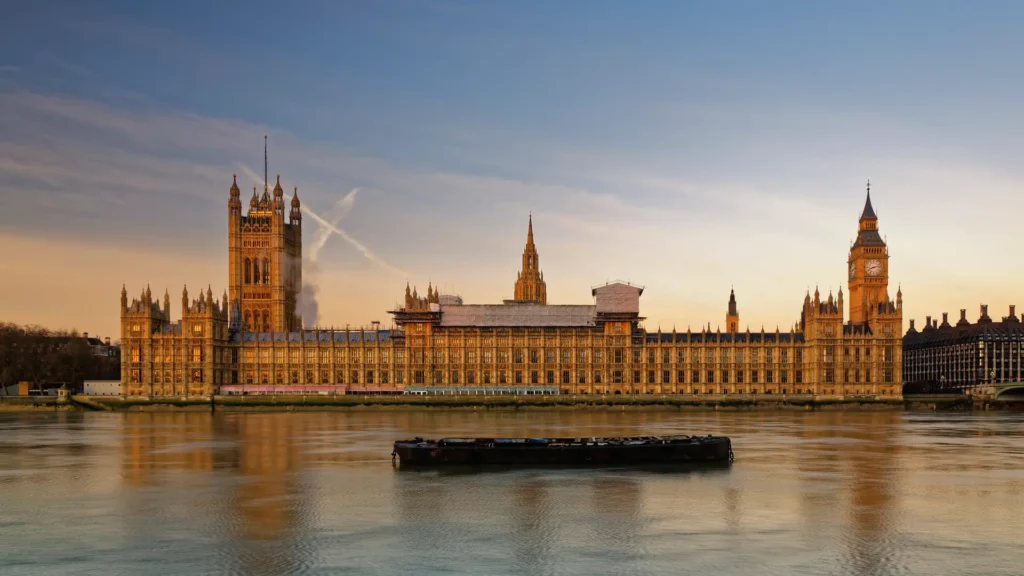The House of Commons and House of Lords are the two Houses of Parliament that make up the legislature in the United Kingdom. Whilst the House of Commons is elected by the people at general elections, the House of Lords is appointed by the Prime Minister of the day.
This blog post will compare the functions and powers of both the House of Commons and House of Lords, to evaluate which of the two is more powerful.
Representing the public
Members of the House of Commons are elected at least every five years by the First Past the Post electoral system at UK general elections. There are 650 seats up for election each time, and it’s a fierce fight. At the most recent election in 2024, the Labour party won 411 seats out of 650, granting them a huge majority.
Once in Parliament, MPs keep their jobs until the next election, unless they resign, pass away, or are removed by their constituents through a recall petition.
Members of the House of Lords, on the other hand, are appointed, rather than elected. There are three types of Lords:
- Life Peers: those that serve for the rest of their lives.
- Hereditary Peers: those that are members because their parent was a member.
- Lords Spiritual: senior members of religious organisations, such as Archbishops and the Chief Rabbi.
As you can see, the House of Lords is heavily criticised for being unrepresentative, as the public have no say over who becomes a member. The House of Commons undoubtedly fulfils its representative function more effectively.
Passing legislation
One of the primary functions of a legislature is to pass legislation (the clue is in the name). The vast majority of legislation emerges in the House of Commons, where ministers from the government introduces bills, which are then debated by members. For a bill to become law, it must pass both the House of Commons and House of Lords. Once it has completed it’s final reading in the Commons, the bill moves to Lords to be debated.
It is here that a specialist function of the House of Lords emerges. They are there primarily to suggest amendments (small changes) to bills, rather than introduce new laws themselves.
The House of Lords is unable to outright reject any legislation, as a result of the 1911 and 1949 Parliament Acts. This reduced their power to a delay of up to one-year. However, in times of crisis, such as the coronavirus pandemic, the House of Commons will be quick to resolve any delays.
Therefore, both the House of Commons and House of Lords play an important role in passing legislation. The Commons is where legislation emerges from, and the Lords is where amendments are suggested.
Financial matters
The House of Commons is the only House of Parliament that can discuss financial matters. The Budget is introduced by the Chancellor of the Exchequer in the Commons annually, and members debate its contents.
As a result of the 1911 Parliament Act, the Lords have no say on financial matters. If a financial bill is held in the Lords for up to one month, it passes even without the House’s approval.
Manifesto pledges
The Salisbury Convention dictates that a government with a House of Commons majority can pass legislation without the need of the House of Lords’ consent. This aims to increase democracy, as members of the House of Commons are elected by the people, and so their wishes should be passed through Parliament easily.
Party discipline
There is a need for a strong and united government in the House of Commons to ensure that important legislation passes in the best possible way. The Commons uses a strong whipping system, whereby members are told how to vote by their own party. Each party; Labour, Conservative, Reform, Liberal Democrats; have a party whip whose job is to persuade their members to side with their party.
A ‘three-line whip’ literally means that a part of a bill is underlined three times by the party whip. Disobeying a three-line whip is very serious, and often results in members being removed from their party and sitting as an independent MP until they have the whip restored.
The House of Lords, on the other hand, takes party discipline much less seriously. This gives a greater opportunity for members to think and vote for themselves. The use their experience and expertise to add nuance to bills, helping to navigate through potential issues.
Thus, whilst party discipline is important in the House of Commons, it is less used in the House of Lords to ensure that a variety of viewpoints are heard, and Lords can use their expertise to add to the bill.
Conclusion: House of Commons vs House of Lords
This article has detailed the different areas that the Commons and Lords can diverge regarding their power. It is clear that the House of Commons is stronger in certain areas, such as manifesto and financial matters.
However, the power of the House of Lords should not be underestimated. They bring experience to Parliament, and can offer a wider variety of viewpoints to add to legislation in the form of amendments. As a result, both Houses play a vital role in keeping our democracy working.







































